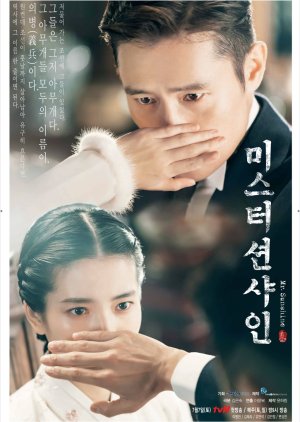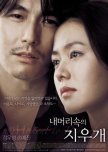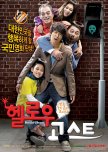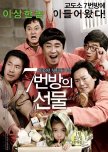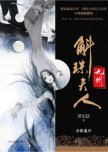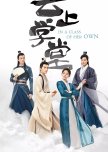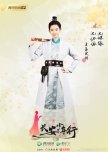
You will not regret
Not many people have seen this drama, I still don't understand why.But if you are hesitating watch it now or leave it unwatched. I can tell you that you are missing a story that will hook you from the beginning to the end.
Do you like Japan? Do you like korea? Do you like United States?
Well, this is your drama, a drama in which three different cultures mix, where you feel every moment, you laugh, you cry, you worry, you can't stop watching it.
And most importantly, it is not a simple story about duty or love, it is more than that.
It is how each of your actions leads you to the right place, to a fight in which you should not be part of but you are in the middle.
What would you do?
Sit back or join the fight?
Was this review helpful to you?

YOU NEED TO WATCH THIS!
i cant exaggerate any more how amazing this drama is. from the story, to cast, to production, this drama is impeccably good. as a film student this is the kind of drama that sets standards for the rest. the filmography is beautiful and awards it indeed deserves.there was never a moment that i was bored or un-interested. the strong build of character makes the smallest of scenes so much more interesting without adding too much to them.
the choice of actors couldn't have been any better, i fell in love with all of them. you do not understand how much i cried at the end of this series (no-spoilers tho), i was left heartbroken as well as heart warmed.
the filmography man... for a film student its like a dream come true.
i dont want to give too much away because its best to jump right into it and find out for yourself.
just please watch this show! i promise you wont regret it!
Was this review helpful to you?
This review may contain spoilers
My Roman Empire
This tale is a marathon. It's not for viewers who can't sit through a slow burn or prefer direct conversations. It is most definitely not for the lighthearted, either.Buckle up; you're in for a fangirl review (read: this could've been finished within 3 lines if I held little affection for it).
I find sageuks enjoyable, but Lee Byung Hun isn't my style. Luckily, their ad ran on YT before, which was intriguing enough. So, first and foremost, cheers to the editing team for their stellar performance from start to finish.
It's 2024. About five years since this masterpiece floored my entire existence, yet Mr Sunshine remains my most beloved kdrama. As someone who lives in a nation that perennially suffers from the consequences of colonialism, this series brought me an overwhelming level of respect for my ancestors, who fought bravely and relentlessly despite the odds being stacked against them. Choosing to live for one's homeland every day is a daunting task. It requires selflessness and primacy. Only those who risk losing something genuinely precious to them can commit to a cause that keeps on taking without any assurance of giving recompense. To devote one's life to their country, they must love their family so fiercely as Eugene and Ae Sin did, enough to let love go and ultimately let love rest.
Mr. Sunshine is a well-rounded production. The cinematography was stunning. The soundtrack was epic. The costume department ate and left no crumbs. The character portrayal was magnificent. I could not think of a single actor or actress who fell short in their delivery. The humor? The banter? The flirting? Sure, kdrama was already popular when this aired. But imagine if it ran post-pandemic? When streaming's the new norm, sageuks are increasingly gaining more popularity, and kdrama has reached unparalleled heights. It would have effortlessly dominated trending searches.
This series remained faithful to its storyline. The plot was cohesive, the pacing was well-timed, the arrangement of symbolisms, forces, politics, and relationships was deliberate, the build-up was masterful, and the ending made sense. Every single moment was touching. The direction was devastatingly beautiful. My heart sings for every lingering gaze, touch, tone, and even the blockings. This was the best collaboration of Director Lee Eung Bok and Writer Kim Eun Sook (Descendants of the Sun & Goblin / Guardian: The Lonely and Great God, some supporting casts appeared in these projects too). This was also Kim Eun Sook at her peak. She has penned multiple bangers, but nothing hits quite like this period fiction.
I can never forget how there was not a single kissing scene. The first romantic kdrama I watched without one. The leads had an explosive chemistry — their impact was simply undeniable. There was no need for physical demonstrations of feelings. Their dialogue was already pure poetry. Their passionate, quiet confessions and mutual pining? It would take years before it can be outdone, let alone be comparable.
It's simply revolutionary.
Once in a while, I'll think about flames and pinwheels and trains and scraps of confessions in matryoshka dolls. I'll think about the man with no country to call his. I'll think about the woman who longs for Joseon's liberation, wearing a ring that honors a love long gone.
I'll forever be scarred by guns, glory, and sad endings. I'll be reminded of my people and how they helplessly came to terms with their unfavorable fates. May they reunite with their loved ones in the afterlife and be at peace knowing their sacrifices will be remembered, even if those who remember have to perpetually argue against their fellow countrymen who have forgotten.
To me, this story is comparable to the creation of the universe. So, whoever plans on writing a wartime romance should take notes because Mr. Sunshine shows how to do it properly.
Was this review helpful to you?

This drama destroyed me.
Why was it so perfectly made? The cinematic shots left me in awe. Who can fault the actors in here? No one. Don't even get me started on the OST... gosh I'm still listening to it.
The storyline and the dialogues were incredibly clever.
Yoo Yeon Seok as Gu Dong Mae, life ruiner. Oh how I love him sooooo much!
Was this review helpful to you?

I would honestly say that I really have high expectations for this drama. It was created by DOTS and Goblin creators so what should we expect right? It was so good that it exceeded my expectation. The storyline was old and based in the past but it was fresh; very new. The twists and rollercoaster ride they added to history made everything perfect.
There were so many things I want to say about it while watching but now that I finished it, I was speechless. I was so attached to the drama that a part of me felt left. It was a lovestory, but it wasn't just about romance. It's about love for family, love for friends, love for strangers who turned to family, love for comrades, love for the people and most especially love for the country. Just when I think I know the word 'love', I was just as clueless as Go Ae Shin, and no language can explain it.
The five actors really gave justice to their characters. I love how 5 different people from different countries with different plans ended up with the same goals. There were bad blood at first, but suddenly turned to fondness, and all became allies. The characters were all so unique and well written. Kim Hui Seong may be narcissist but he was never arrogant. He was so loving, selfless and precious. Go Dong Mae is evil, and he really is. But when it comes to the people he values, he is willing to risk everything. Who wouldn't love Kudo Hina? She's a strong woman who doesn't need any man in her life to back her up. As for Eugene Choi, oh my god, I love him so much. And Go Ae Shin? She's the best! Despite being noble and being untouchable she still stood tall and fought for the people who are powerless.
I was first skeptical to start because I've seen the age gap but it never bothered me. Thank God I really gave it a try.
"Guns, glory, sad endings"
I was wondering why those words were kept being mentioned in the first episodes and realized that the whole story revolved around those three words. The guns, where it all started. The glory, as every characters strove for their beliefs. And sad endings, because endings means good byes.
P.S. If you're planning on watching it get your tissues ready. It will be a fun but painful ride.
Was this review helpful to you?

Overall, this is definitely a gem and one of the best-produced Korean dramas out there. If you enjoy beautiful shots, historical shows and good quality dramas in general, please pick this one up and watch it. It will forever be remembered and quoted by me anyways!
Was this review helpful to you?
Everyone of the five main characters touched my heart in different ways. The acting was on point. The humour was delightful especially as the relationship of the three men moved to a different level of empathy and understanding. The scenes in which Ae Shin learns English and Eugene learns Korean were delicious!
And most beautiful of all was the love story of the American Joseon soldier who didn't belong anywhere and the plucky young Go Ae Shin who fought to protect her motherland. He loved her but he hated Joseon and yet he helped her in every way he could. This is the best love story I have ever watched in a kdrama and I find myself going back to their scenes together again and again.
Was this review helpful to you?

A beautiful romance that always find its way home in tragedy and sadness. Mr. Sunshine shows how far one can go to protect the thing you love, your country, your people, and the one you truly love. It depicts love that forgets its social status, work position and birth right, but every choice they made to pursue such love reminds them of all the things they tried to neglect.
Mr. Sunshine achieved its high caliber quality through its great cinematography, good story and right casting. I can never wished for more to its casting especially the five main leads. All those artist except Yoo Yeon Seok, are not familiar with me. I’ve seen Lee Byung Hun but never got a chance to watch his dramas, but because of Mr. Sunshine I will. I think his comeback on the small screen, really means that he really trusted this project. At first look, I really don’t find any chemistry with the main couple, or to any main leads. But after I watched it, I can never wished for anyone who will act for those main lead characters. The support characters are worth mentioning for they take the whole drama to next level. I really love Gunner Jang.
The drama runs on 24 episodes for 70-80 minutes long. It is longer compares to other drama. I think it can have less scenes to lessen the number of episodes but it will spoil the sincerity of each scenes. The background view, the stare, the silence, the flashbacks and every second of this drama is truly breathtaking.
One of the most tragic ending for all the characters but a happy ending for Joseon. As much as how heartbreaking main leads’ fate have been, it still such a great finale.
P.S. And I of Nuest, one of drama’s OST brought me here.. And I will be forever thankful for that. Every OST in this drama is such a good tracks.
Was this review helpful to you?

poignant, beautiful, inspiring... a masterpiece
mr. sunshine's power and beauty cannot be expressed in words.this story was perfect from start to finish. chills, tears, smiles and butterflies are guaranteed.
i'll keep it short, this is the real gem you're looking for in kdramas. a must watch.
the cinematography is impeccable, the music heartbreaking, the acting powerful, the story heart wrenching and riveting. every character was so intriguing and deeply developped, which made you very attached to each and everyone of them. from anti heroes like kudo hina and dong mae, to brave patriots like aeshin, all flaws, strengths and weaknesses of the characters were wonderfully portrayed. the episodes had me glued to the screen, the pace was perfect. i would've even watched a 60 episode long mr. sunshine haha !
but most importantly, this is a heavy but crucial story of the fight for independance, which will make you tear up and squeeze your fists. if you haven't watched it already, please do. i'd love experiencing watching mr. sunshine for the first time again,,, so please enjoy !
Was this review helpful to you?

You know how lots of dramas start off strong and peter out? This one starts strong and gets stronger and stronger as it progresses. The story pacing seemed a bit slow to me at first. There may be a few too many dramatic pauses. But it's worth it. As the plot unfolds it really builds to an exciting crescendo that wouldn't have been as powerful or heartbreaking if we hadn't been given the time to really know the characters. The last few episodes are so powerful I can't get some of the images out of my head. It finishes strong.
The story centers around 5 main characters - each intriguing and well portrayed - each with a particular viewpoint and relationship with the country of Joseon. There is Eugene, the slave who escapes to America as a young boy and returns for revenge, Ae Shin, the badass noble woman who leads a double life as a rebel and Dong Mae, the fearsome swordsman with a fatal weakness. Hina is the tough, enigmatic hotel proprieter and Hui Seung is Ae Shin's affable fiance. These characters play off each other marvelously. I love the unspoken and begrudging admiration that develops between them - even when their motives are sometimes at odds. I fell in love with them and I cried for them all.
There are so many pieces to the story and its put together perfectly - a great balance between the history, love story and thrilling action scenes. There's even a little humor and cuteness. Mr. Sunshine is a beautiful historical drama - well written, exciting, emotionally stirring and heartbreaking. Don't miss it!
Was this review helpful to you?

The five main characters are a dream to watch. You feel for them very strongly early on and even if you think that some of them are a bit extra, they get under your skin.
I loved Eugene the most, though. His relationship with Ae-sin was my favourite part of the drama. It reminded me of Jane Austen's Emma - he accepted her, admired her, let her be herself and loved her so very much.
If I loved it less, I might be able to talk about it more.
Was this review helpful to you?

Name a more Oscar-worthy drama… I’ll wait
Upon a quick glance at the title and the promotional poster, you’re probably already thinking wow, this sure looks underwhelming! Well, dare I say that those were precisely my first thoughts – but now, I don’t even hesitate for one second when someone asks me whether this drama is any good, because my answer will always be the same, and that is: ‘exceptional’ doesn’t even begin to cut it.Initially, I thought the premise was very lacklustre – set in the early 1900s, this mini-series focuses on Righteous Army activists fighting for Korea’s independence against foreign forces, but the more I watched, the more I began to realise how fascinating this was. Not only did it act as a device to help viewers establish the rationale behind each of the character’s motives, but it also contributed to the story’s development in more ways than I could have imagined. The idea of a premise is that it lays down the most basic foundation of a writer’s work, and just like a movie post or an illustrated cover of a book, it paints a simple image of what’s inside, but not much more. And here’s the thing, it’s incredibly unfortunate to still see so many K-drama writers (whether old or new to screenwriting) fall into this rut when it comes to bringing an idea to life. However, for Mr. Sunshine screenwriter Kim Eun-sook, this doesn’t ever appear to be a problem she faces.
Kim is one of the most accomplished and sought after screenwriters in the industry, and it’s a no-brainer as to why this is the case. In the last 10 years, she has written the script for some of the most commercially successful dramas: Secret Garden (2010), A Gentleman’s Dignity (2012), The Heirs (2013), Descendants of the Sun (2016), Goblin (2016), The King (2020), and this drama included. Yes, she may have incorporated overused clichés in a few of her written work (e.g. rich guy-poor girl, evil mother-in-law, etc), but at the same time, it’s evident she continues to develop narratives which are so unique and enthralling; a talent which is unsurpassed in the industry. Unlike many writers whose dramas flopped, each one of her projects has stood the test of time, and this drama is no exception.
But the success of Mr. Sunshine ought to be shared equally with director Lee Eung-bok, whose creative direction and vast use of cinematic techniques in this drama was just out of this world. Together, they raised viewers’ awareness of Korea’s history, and shed light on those deemed peripheral in society. Many with very little understanding or are quick to judge will say that everything portrayed is historically inaccurate or rubbish, but what these people fail to acknowledge is that these very cruel and tragic events did happen, and whether or not this drama perfectly encapsulated that 101% accuracy is irrelevant. Mr. Sunshine was a cleverly crafted masterpiece to simply put, and I have no doubt the producer called in a historian to ensure the historical and factual basis of the premise was presented in such a way that had more to do with the storyline and character development, rather than the accuracy value it would have added to the plot.
The storyline was wonderfully perplexing, with each dramatic turn adding all these unexpected twists. It was fuelled with long-awaited revenges, political debacles, and palace shambles, all atop a crumbling social class system and a country’s disastrous attempt at stopping the Japanese from invading. Unlikely friendships formed, loyalties tested, identities challenged, and moral compasses questioned, but till the very end, not one person flinched, nor did they flee their allegiance to join another simply for the sake of love or friendship. But what I really appreciated about Mr. Sunshine would be this: the delivery of a poignant love story without the need for any kissing scenes.
I’m not going to lie when I say that there’s got to be smooching involved to make the chemistry somewhat convincing, but even when there was none of that here, I wasn’t the slightest bit concerned or disappointed. Because when there was grief, I ugly cried; when there was suspense, I went numb; when characters embraced, my heart melted; when a character experienced pain, I too felt my heart being ripped out of my chest; whenever a villain or antagonist appeared, my insides burned with rage; when a character showed their quirks, I chuckled with amusement; and last but not least, when a scene was so profoundly sad, it did more than just move me beyond tears.
I also admired Kim’s screenwriting, because instead of cheapening the plot with unnecessary exchanges, I found myself immersed in eloquent poetry and an engaging dialogue that actually built towards something, whether it was revealing important information about a course of action or disclosing a certain character’s disposition. And every time a flashback or sentimental object re-appeared, I knew what purpose it served because the story behind it was so powerful that it became an etched memory (e.g. Lady Yun’s norigae (ornament), ragged shoe floating in the well, wooden music box, red paper windmill, etc). The stunning cinematography was also something to marvel at; not just acting as a visual aid, but in creating this immersive historical experience. With a beautifully composed soundtrack to match, I was well and truly enchanted. (Two songs in particular which struck a chord was Park Hyo-shin’s “The Day”, and Baek Ji-young’s “See You Again”; both of which evoked so much soul, emotion, and lyrical meaning).
But what this drama could really not have done without was the outstanding performance of its talented cast (whether lead or supporting). The main cast comprising of Lee Byung-hun, Kim Tae-ri, Yoo Yeon-seok, Kim Min-jung and Byung Yo-han all had a unique charisma and stage presence about them, and I’m so thankful that their talents did not go to waste when they auditioned for their respective roles as Eugene Choi, Go Ae-shin, Gu Dong-mae, Kudo Hina and Kim Hui-seong. To be able to see each individual connect with their characters by immersing themselves in the script was one thing, but then the ability to translate and deliver the right amount of expressive energy and a certain personality on-screen was another. Thus, it was really pleasing to see that actor was emotionally, mentally, and physically invested in whatever challenges their character faced.
To start off, Lee Byung-hun did a marvellous job acting as Eugene Choi. His natural charm and ability to bring so much depth and emotion to the screen was very enthralling, and I couldn’t help but be captivated every time his character spoke, laughed, or smiled. Eugene was a man of chivalry and didn’t hesitate to rise and display authority whenever he was placed in a position of conflict. He was clever, ballsy, and uncompromising, but at the same time, considerate, sincere, and likeable because he always spoke his mind. Lee’s action scenes in particular just exuded this wow factor you’ll rarely see from other male leads; attributed to all the stunt, weapons, and martial arts training he had done in the past to be better prepared for his Hollywood action roles. Combined with his knack for being able to also speak English and Japanese fluently in the drama – you couldn’t help but think, what can’t this man do?! If anything, Lee is a true embodiment of fine wine that gets better with age.
Likewise, Kim Tae-ri absolutely killed it as Go Ae-shin, and who would have thought Mr. Sunshine would be her first breakout role on the small screen! What really stood out to me about Kim’s character was that she was such a badass, fierce, smart, and tenacious noblewoman who wasn’t unlike every other female lead, and it was only through her ability as an actress that she was able to deliver a strong and empowering female protagonist that was more than just a pretty face. Ae-shin was quite literally living proof of Mulan under disguise in a black suit, and the fact that she risked her life, nobility and feminity by switching out of a traditional hanbok and into clothing that placed her in a man's world to protect her country, and her country’s people was worthy of admiration. Simultaneously, Kim did a stunning job at portraying Ae-shin as this graceful aristocratic lady whose posture, speech, and movements were refined, articulate and well-paced.
But if there’s one person who I really want to commend for his acting, it would be Yoo Yeon-seok. This man’s performance was just incredible, and even if his character were barbaric and callous, you have to really give him credit for emulating someone like Gu Dong-mae. Dong-mae was the kind of character that gave you chills just by the way he smirked, tinkered with his samurai swords, or held a gaze, and that’s the sort of talent you want to invest your time in watching. That said, his character wasn’t all that coldblooded and indifferent. Eventually, we see that he wants to be a part of a society where people don’t fear him, and whenever we caught a glimpse of his softer side, it was often met with sorrow and sympathy. Yoo genuinely did an excellent job at his portrayal of Dong-mae not only as the loyal and merciless leader of Musin Society, but also as someone who was authentic and selfishly selfless.
It is also worth noting that Mr. Sunshine upped the ante to showcase the strength and power of women in characters like Kudo Hina/Lee Yang-hwa (Kim Min-jung). Although her role was secondary to that of Go Ae-shin, I really admired how Kim’s character was this affluent, elegant, cultured, and classy modern-day lady who was very ruthless at times. Her role as an accomplished owner of Glory Hotel not only allowed her to indulge in elaborate kimonos, Edwardian fashionwear, and an array of Victorian-era hairstyles, but it also gave her the opportunity to shine through as a skilled linguist, fencer, trendsetter, and businesswoman. It’s quite rare to come across a second female lead this alluring, and a multifaceted character at that, so needless to say that I was impressed by how Kim always exuded the right amount of charisma with the perfect expressions to match in her portrayal of Kudo Hina.
And then there's Kim Hui-seong (Byun Yo-han), the charming third male lead who plays the second wealthiest man after the King of Joseon. From his use of self-deprecating humour to enliven sticky situations, playful teases, and softly-spoken lines, to the way he showed true, genuine concern for those around him, Hui-seong was nothing quite like the condescending and smooth-talking Casanova aristocrat I thought he’d be. Byun showed the audience that his character was more than just a womaniser; he was a gentle soul, risk-taker and a free-spirit who really wanted to contribute to society. It also goes without saying that he is a natural when it comes to conveying the expressions of someone who is genuinely in love. Hui-seong’s gaze always dazzled with adoration for his fiancée, and he never hesitated to wear a tender smile which carried with it this sweet sadness.
Final comments
I have never been more impressed by an AMAZING supporting cast, and although I may not know everyone’s names, it is without a doubt that their acting has left a lasting impression on all viewers such as myself. Kim Eui-sung especially, did an incredible job acting as Lee Wan-ik (the drama’s primary villain) and it only just occurred to me that he played the evil businessman in ‘Train to Busan’. Honestly, this guy’s expertise must be in villainous roles because his character in Mr. Sunshine was hardcore wicked with no redeeming qualities, and the fact that he could make you hate his character’s guts on a level you’ve never felt before is a true testament to one’s acting capabilities.
Not only did Mr. Sunshine record the 6th highest rating for any given episode in cable television (previously coming in 3rd place before the release of Hotel del Luna [2019], Crash Landing on You [2019-20] and the World of the Married [2020]), but it also netted an overall average rating of 12.955%, making it the second highest-rated K-drama of all times in cable television. What makes this latter figure far more significant than the first is because not only does it reflect the popularity of the series during its broadcast, but it also evidences strong audience engagement.
There is no doubt that Mr. Sunshine is probably my most favourite drama to date (along with Crash Landing on You and Signal), but if you ever just need to know why again, please don't hesitate to re-read this review.
Favourite quotes
Kudo Hina: “Three men who are worse than strangers are gathered in one room.”
Ae-shin: “Not goodbye but see you again.”
Lee Wan-ik: “I may be a mutt or a hound, but I’m the boss of all other dogs.”
Ae-shin: “You only have one bullet”, Eugene: As always, I just need to use it wisely.”
Kudo Hina: “Before you leave, act like a decent father for once in your life.”
Dong-mae: “We, unlike our parents, can shoot a gun or drive a sword through anyone.” Eugene: “I made a choice. We, unlike our parents, have the luxury of making choices.”
Ae-shin: “Gun. Glory. Sad Ending.”
Character summaries
Eugene Choi/Choi Yu-Jin (Lee Byung-hun) is the son of slave parents who flees Joseon at a young age and becomes a naturalised American citizen. Growing up, Eugene knew he was different from all the other kids – from his skin colour, long hair to his poor English speaking abilities – getting heavily bullied as a result. From the point he realises that he can no longer live as a Joseon man in a western world, his growth is exponential, and Eugene defies all odds to end up becoming a very admirable U.S. Marine Corps officer. Despite his accomplishments, he continues to be tormented by his past memories of being hunted down by slave hunters and keeps hold of Lady Yun’s norigae (a traditional Korean accessory that is hung from a woman’s hanbok skirt) as a reminder of his mother’s sacrifices. But make no mistake when I say each flashback of Eugene being thrown that norigae by his mother came with profound sadness; a true testament to the saying that “a mother's love for her child is like nothing else in the world. It knows no law, no pity. It dares all things and crushes down remorselessly all that stands in its path." But that is not the only object which served a purpose in the story – Eugene also kept with him a very peculiar wooden music box, which played a hauntingly enchanting yet sorrowful melody. What made this music box so special was its significance to Eugene; the melody evoked happiness, hope, and life in spite of the tragedy and grief he suffered fleeing Joseon as a very young child.
Upon his return to Joseon, we see that Eugene’s unwavering loyalty to America remains unchanged when he is sent to the American Legation in Joseon to uphold peace and friendly relations between the two countries. Although he is often dragged into Joseon’s political debacles by Emperor Gwangmu (Lee Seung-joon) and anti-Japanese minister, Lee Jeong-moon (Kang Shin-il), Eugene explains that he has no intention to be swayed by their desperation to protect Joseon from Japan and all for a very good reason. At the same time, we learn that every action he makes is somehow unintentionally politically motivated – both a win for himself, and for the Emperor and his underlings; demonstrated by what he ends up doing with the ‘Certificate of Deposit’ (i.e. the King’s bank certificate), Minister of Foreign Affairs, Lee Se-hun, and his position at the Royal Military Academy where he shares with his trainees a very powerful Arabic proverb: “An army of sheep led by a lion would defeat an army of lion led by a sheep.” Although Eugene is seen to be this serious, calculating, and audacious character, I loved that he also had this warmer side to him which he shared with Go Ae-shin (Kim Tae-ri) – the Joseon woman he fell in love with and cherished more than his own life.
Unlike Eugene, Ae-shin was more reserved and careful with how she carried herself, and their love story was met with a lot of difficulties and uncertainties whenever a mission arose, or their situations changed, and neither of them would know the outcome of one another – symbolised by the placing of a red paper windmill at each other’s place of residence, or at the Apothecary (where they would often meet in secret). Although the portrayal of their relationship was far from the lovey-dovey type that you would otherwise normally expect to see in K-dramas, you could tell that their love for each other was nonetheless so pure, and every misty-eyed gaze and embrace became more heart-wrenching than the last.
The daughter of an aristocrat, Ae-shin was well-known for her kind heart; never faltering to help those she saw in need. As if brains and beauty was not enough, Ae-shin ended up following in her parents’ footsteps to become a part of the Righteous army, a movement led by her grandfather to protect Joseon people from threats instigated by Japan and foreign forces. Although she was refused involvement on many occasions by Lord Go, I loved that her persistence, grit, determination, and fearlessness to provide for Joseon and more trumped feminity and nobility, thereafter, becoming the army’s most-skilled sniper after her master, gunman Jang Seung-goo (Choi Moo-sung). If there was anything to admire about her character, it would be that she was a reticent catalyst for Joseon people’s freedoms and women's liberation – and who doesn’t love a strong, empowering female lead?
Was this review helpful to you?

